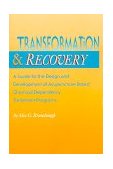Resources for Acupuncture in Chemical Dependency Treatment and Recovery

Like all drug intervention strategies, acupuncture works best within the context of a rich and comprehensive treatment program that includes counseling, education, case management, medication therapies, and drug testing. In these settings, there is an abundance of anecdotal evidence that it works exceptionally well on multiple levels to support clients in achieving sobriety.
Acupuncture is not a "magic bullet," and cases are rare in which it completely alleviates all alcohol and drug withdrawal symptoms. Its great value is that it makes these symptoms manageable for people attempting recovery.
Acupuncture research - on both humans and animals - has unequivocally demonstrated that properly placed acupuncture needles impact physiological processes. For example, it has been proven that acupuncture reduces pain and relieves depression, reduces excess stomach acid, and speeds up the rates at which the body metabolizes and eliminates alcohol.
Researchers have not been able to replicate many studies showing excellent success in treating acute withdrawal using 5-point auricular (ear) therapy. Clinical trials on acupuncture in the drug treatment setting are as problematic as clinical trials in all aspects of drug treatment. The reason for this is that all drug treatment interventions and strategies depend for their success on the context in which they are delivered, and on a host of variables that contribute to that context. Imagine, for example, that a researcher goes to a comprehensive drug treatment program and picks out one of the multiple strategies that are used in that program to see if it is effective. He takes that strategy to a university setting to eliminate all of the variables that exist in the treatment program. The results would not accurately reflect the efficacy of the strategy because it is being studied out of its normal context, "in a vacuum." Several acupuncture studies have been conducted this way. The subjects received money for their participation; the study was not conducted at a treatment program; the subjects received no counseling or education, and the acupuncturist wasn't allowed to talk to them even if they asked for extra help or referrals for their addiction.
See also:The Acupuncture-Adenosine Connection: Implications for Addiction Treatment and Research
previous - Read FAQs in Sequence - next
Index of Articles - Links - Home
How many clients can be treated at once?
How often do clients need to be treated?
How long to clients have to keep having treatments?
Does it matter what time of day the acupuncture is provided?
What
national organizations support acupuncture in treating addiction? What
resources are available to support us if we decide to do it?
Does
the acupuncture program have to include herbs or nutritional supplements?
What
is the history of how acupuncture began to be used in chemical dependency
treatment?
What
does the acupuncture clinic look like exactly?
How
much space and extra equipment will we need to do it?
How
do we clean or dispose of the needles after they are used?
How
does acupuncture fit with drug testing?
How
do we find and train people to do the needling?
Could
we just try it experimentally to make sure it's a good fit for us?
What
technical assistance will be required to start and maintain an acupuncture
component?
Is
it compatible with harm reduction?
Is
it compatible with 12-Step or abstinence-based treatment approaches?
Is
it appropriate for mandated or court-referred clients?
Is
it appropriate for adolescents?
Is
it appropriate for pregnant women?
Is
it appropriate for people with co-morbid psychiatric problems?
Is
it appropriate for people with HIV/AIDS?
Is
it appropriate in methadone programs?
Is
it appropriate in residential programs?
What
training is required for current program and administrative staff?
What are the steps we should take to add an acupuncture component?